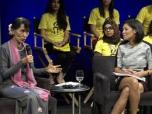Aung San Suu Kyi came to Washington this week to receive the Congressional Gold Medal. She met with President Obama and also spoke at a town hall meeting at the Newseum sponsored by Amnesty International.
An advocate of nonviolence and a defender of human rights, Aung San Suu Kyi was a Burmese political prisoner—held under house arrest for fifteen years. "It was a long, lonely fight," Amnesty's Suzanne Nossel said in her introduction of Aung San Suu Kyi. "Long it was, but not lonely," she answered. "I knew there were people out there rooting for me, working for me, trying their best to make sure that I would gain my freedom."
Speaking to the many students in the audience, Aung San Suu Kyi said: It is the task of young people not just to free political prisoners but to free the minds of the people who make political prisoners. The seed of hatred comes from fear—and that fear can be irrational. People are afraid of things that are different from what they have known.
I watched the live webcast of this event not only because I am a longtime admirer of Aung San Suu Kyi but because the moderator was none other than Alex Wagner, host of MSNBC’s “Now with Alex Wagner.” Alex has been my daughter Kate’s good friend since they met at Alice Deal Junior High School. Back then Alex was super fun and very funny—and also super serious and very sharp. She still is all of those things.
For an ancient history project Kate and Alex did a project on Queen Hatshepsut. There was no diorama of the Valley of Kings (or Queens). The two 7th graders staged a rather professional (and sensational) interview featuring the Egyptian queen and an ace reporter.
Alex was at it again, deftly and warmly moderating yesterday’s discussion with Aung San Suu Kyi. Alex is half Burmese—both her mother and 96-year old grandmother, who were born in Burma, were in the audience. Since 2008 Alex has made several trips to Burma to advocate for human rights.
“I never felt despair,” Suu Kyi answered when Alex asked her to talk about the times when she felt most despondent while under house arrest. Suu Kyi recognized that house arrest was a lot easier than imprisonment and worried about those who were outside. She explained that she made it through those long years in large part because she loved to read. “Through my books I could get to wherever I wanted to go.”
Asked what kept her up at night, Suu Kyi said that it is not her worries that keep her up at night. When something troubles her, she reminds herself that after 24 hours her worry will seem much less serious. That simple thought makes her feel much better—she suggested that her audience give it a try.
When discussing the Arab Spring and its aftermath, Suu Kyi was firm: “Human rights and violence do not go together.” She does not understand people who think that violence is a legitimate way to defend human rights. "You should protect human rights through your ability to resist violence. Unless you can do that you will not be upholding human rights in the long run. . . . If the means are not right then the ends will be distorted. If you want to work for human rights you have to be prepared to endure—not so much to move against others but to stand against others. You can do many things that you did not think were possible.”
Suu Kyi reminded the audience that Burma was one of the first countries to sign the Universal Declaration of Human Rights—and that these rights belong to every single human being.
The most difficult question to answer came from a student who asked about the persecution of the Rohingya, a Muslim ethnic minority who lack citizenship rights. Many have fled to neighboring Bangladesh. Suu Kyi answered that one should avoid “emotive” or “accusative” words such as “persecuted.” It was important, she said, to resolve the issue through the rule of law. She clarified her three main points: 1. Crimes must be handled as they occur. 2. The rule of law must be linked to everybody’s human rights and to protect all people. Everybody in Burma must have the rights of citizenship. 3. We must make sure there are no illegal crossings of the border. We must contain the situation and then diffuse the tension. This cannot be done overnight.
People should sit back and think of ways to resolve problems, Suu Kyi said. Accusations do not always resolve problems. Condemnation does not necessarily bring about reconciliation. She acknowledged that distrust between minorities and the majority is of long standing and she stressed that society must not allow authoritarian regimes to take over. When her party was oppressed by the military regime their strongest allies were the ethnic parties. “They stood by us. We have known from experience that unity can be achieved through understanding.”
At that moment technical difficulties silenced Suu Kyi’s mike—Alex explained, “It was the power of your oratory.” Being with Aung San Suu Kyi gave her reason not just to hope in the unseen but to believe in it.
